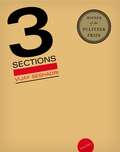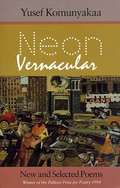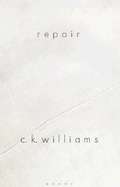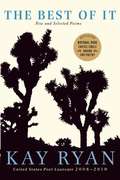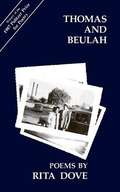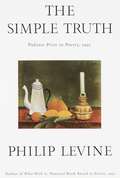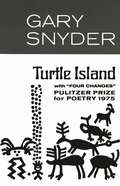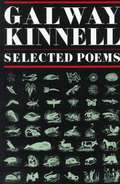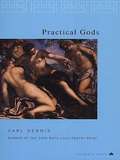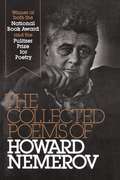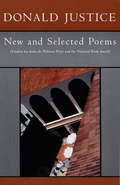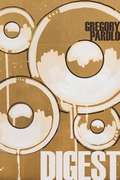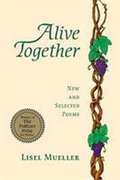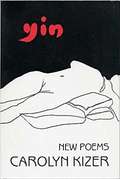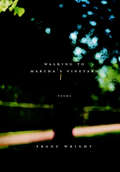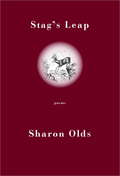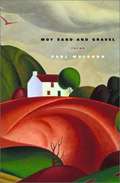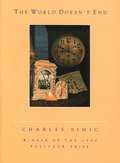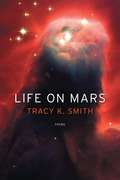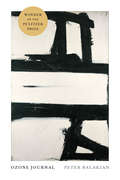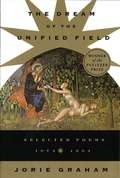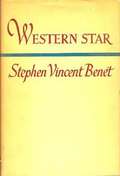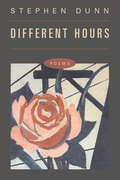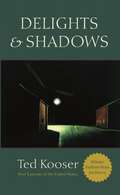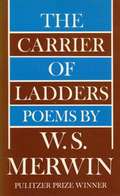Special Collections
Pulitzer Prize Award Winners
Description: Bookshare is pleased to offer the following titles, winners of the Pulitzer Prize Award. Note: Some drama winners are available and are listed under Fiction awards. #award
- Table View
- List View
3 Sections
by Vijay SeshadriThe long-awaited third poetry book by Vijay Seshadri, "one of the most respected poets working in America today" (Time Out New York). Vijay Seshadri's new poetry is assured and expert, his line as canny as ever. In an array of poetic forms from the rhyming lyric to the philosophical meditation to the prose essay, 3 Sections confronts perplexing divisions of contemporary life-a wayward history, an indeterminate future, and a present condition of wanting to outthink time. This is an extraordinary book, witty and vivacious, by one of America's best poets.
Winner of the 2014 Pulitzer Prize in Poetry
Neon Vernacular
by Yusef KomunyakaaABOUT THE AUTHOR: Yusef Komunyakaa is a professor in the Council of Humanities and Creative Writing at Princeton University. He is the author of five Wesleyan titles including the Pulitzer-winning Neon Vernacular (1993), which also won the Kingsley-Tufts Poetry Award from the Claremont Graduate School, Thieves of Paradise (1998), Magic City (1992), and Dien Cai Dau (1988). In 1991 he won the Thomas Forcade Award, in 1993 he was nominated for the Los Angeles Times Book Prize in Poetry, and in 1997 he was awarded the Hanes Poetry Prize.
Repair
by C. K. WilliamsRepair is body work in C. K. Williams's sensual poems, but it is also an imaginative treatment of the consternations that interrupt life's easy narrative. National Book Critics Circle Award-winner Williams keeps the self in repair despite love, death, social disorder, and the secrets that separate and join intimates. These forty poems experiment with form but maintain what Alan Williamson has heralded Williams for having so steadily developed from French influences: "the poetry of the sentence".
Pulitzer Prize Winner
Thomas And Beulah
by Rita DoveStory told in poems of the African Amarican poet's grandparents' marriage, migration to Akron, Ohio in the first half of the 20th Century.
Pulitzer Prize 1987.
The Simple Truth
by Philip LevineWritten in a voice that moves between elegy and prayer, The Simple Truth contains thirty-three poems whose aim is to weave a complex tapestry of myth, history (both public and private), family, memory, and invention in a search for truths so basic and universal they often escape us all.
Winner of the Pulitzer Prize
Turtle Island
by Gary SnyderWinner of the Pulitzer Prize for Poetry (1975). These Pulitzer Prize-winning poems and essays by the author of No Nature range from the lucid, lyrical, and mystical to the political. All, however, share a common vision: a rediscovery of North America and the ways by which we might become true natives of the land for the first time.
Selected Poems
by Galway KinnellThe poems include two of Kinnell's most frequently reprinted poems, "Saint Francis and the Sow" and "After Making Love We Hear Footsteps" Kinnell draws for his poetry from experiences living in Vermont and New York, as well as from teaching in France, Australia, Iran, and many colleges and universities in this country. Kinnell is now retired from his position as the director of the Creative Writing Program at New York University.
Winner of the National Book Award
Pulitzer Prize Winner
Practical Gods
by Carl DennisWinner of the 2001 Pulitzer Prize for Poetry. Practical Gods is the eighth collection by Carl Dennis, a critically acclaimed poet and recent winner of one of the most prestigious poetry awards, the Ruth Lilly Prize. Carl Dennis has won acclaim for "wise, original, and often deeply moving" poems that "ease the reader out of accustomed modes of seeing and perceiving" (The New York Times). Many of the poems in this new book involve an attempt to enter into dialogue with pagan and biblical perspectives, to throw light on ordinary experience through metaphor borrowed from religious myth and to translate religious myth into secular terms. While making no claims to put us in touch with some ultimate reality, these clear, precise, sensitive poems help us to pay homage to the everyday household gods that are easy to ignore, the gods that sustain life and make it rewarding. .
The Collected Poems of Howard Nemerov
by Howard NemerovThe former Poet Laureate of the United States, Nemerov gives us a lucid and precise twist on the commonplaces of everyday life.The Collected Poems of Howard Nemerov won both the National Book Award and the Pulitzer Prize in 1978. "Howard Nemerov is a witty, urbane, thoughtful poet, grounded in the classics, a master of the craft. It is refreshing to read his work. . . . "—Minneapolis Tribune "The world causes in Nemerov a mingled revulsion and love, and a hopeless hope is the most attractive quality in his poems, which slowly turn obverse to reverse, seeing the permanence of change, the vices of virtue, the evanescence of solidities and the errors of truth."—Helen Vendler, New York Times Book Review
New and Selected Poems
by Donald Justice"He is one of our finest poets, " Anthony Hecht has said of Donald Justice. Winner most recently of a 1996 Lannan Literary Award, Justice has been the recipient of almost every contemporary grant and prize for poetry, from the Lamont to the Bollingen and the Pulitzer. The present volume replaces his 1980 Selected Poems and contains, in addition, poems from the last 15 years.
Pulitzer Prize Winner
Digest
by Gregory PardloFrom Epicurus to Sam Cooke, the Daily News to Roots, Digest draws from the present and the past to form an intellectual, American identity. In poems that forge their own styles and strategies, we experience dialogues between the written word and other art forms. Within this dialogue we hear Ben Jonson, we meet police K-9s, and we find children negotiating a sense of the world through a father’s eyes and through their own.
Winner of the 2015 Pulitzer Prize for Poetry
Alive Together
by Lisel MuellerIn a collection that represents over thirty-five years of her writing life, this distinguished poet explores a wide range of subjects, which include her cultural and family history and reflect her fascination with music and the discoveries offered by language. In fact, her book is a testament to the miraculous power of language to interpret and transform our world. It is a testament that invites readers to share her vision of experiences we all have in common: sorrow, tenderness, desire, the revelations of art, and mortality - "the hard, dry smack of death against the glass." To this community Mueller presents moments after moment where the personal and public realms intersect, where lives ranging from her own to those of Mary Shelley and Anton Webern illuminate the ways in which history shapes our lives. In "Brendel Playing Schubert," Mueller's breathtaking linguistic virtuosity reminds us how music can transport us out of ourselves and into "the nowhere where the enchanted live"; in "Midwinter Notes," the crepuscular world, stripped of its veil, shines forth as a signal from some realm where the sense of things may be revealed. In the title piece Mueller brings a sense of enduring and unclouded wonder to a recognition of all those whose lives might have been our own.
Pulitzer Prize Winner
Walking to Martha's Vineyard
by Franz WrightIn this radiant new collection, Franz Wright shares his regard for life in all its forms and his belief in the promise of blessing and renewal. As he watches the “Resurrection of the little apple tree outside / my window,” he shakes off his fear of mortality, concluding “what death . . . There is only / mine / or yours,– / but the world / will be filled with the living. ” In prayerlike poems he invokes the one “who spoke the world / into being” and celebrates a dazzling universe–snowflakes descending at nightfall, the intense yellow petals of the September sunflower, the planet adrift in a blizzard of stars, the simple mystery of loving other people. As Wright overcomes a natural tendency toward loneliness and isolation, he gives voice to his hope for “the only animal that commits suicide,” and, to our deep pleasure, he arrives at a place of gratitude that is grounded in the earth and its moods.
Stag's Leap
by Sharon OldsIn this wise and intimate new book, Sharon Olds tells the story of a divorce, embracing strands of love, sex, sorrow, memory, and new freedom. As she carries us through the seasons when her marriage was ending, Olds opens her heart to the reader, sharing the feeling of invisibility that comes when we are no longer standing in love's sight; the surprising physical bond that still exists between a couple during parting; the loss of everything from her husband's smile to the set of his hip; the radical change in her sense of place in the world. Olds is naked before us, curious and brave and even generous toward the man who was her mate for thirty years and who now loves another woman. As she writes in the remarkable "Stag's Leap," "When anyone escapes, my heart / leaps up. Even when it's I who am escaped from, / I am half on the side of the leaver." Olds's propulsive poetic line and the magic of her imagery are as lively as ever, and there is a new range to the music--sometimes headlong, sometimes contemplative and deep. Her unsparing approach to both pain and love makes this one of the finest, most powerful books of poetry she has yet given us.
Moy Sand and Gravel
by Paul MuldoonPaul Muldoon's ninth collection of poems, his first since 1998, finds him working a rich vein that extends from the rivery, apple-heavy County Armagh of the 1950s, in which he was brought up, to suburban New Jersey, on the banks of a canal dug by Irish navvies, where he now lives. Grounded, glistening, as gritty as they are graceful, these poems seem capable of taking in almost anything, and anybody, be it a Tuareg glimpsed on the Irish border, Bessie Smith, Marilyn Monroe, Queen Elizabeth I, a hunted hare, William Tell, William Butler Yeats, Sitting Bull, Ted Hughes, an otter, a fox, Mr. and Mrs. Stanley Joscelyne, an unearthed pit pony, a loaf of bread, an outhouse, a killdeer, Oscar Wilde, or a flock of redknots. At the heart of the book is an elegy for a miscarried child, and that elegiac tone predominates, particularly in the elegant remaking of Yeats's "A Prayer for My Daughter" with which the book concludes, where a welter of traffic signs and slogans, along with the spirits of admen, hardware storekeepers, flimflammers, fixers, and other forebears, are borne along by a hurricane-swollen canal, and private grief coincides with some of the gravest matter of our age.
Pulitzer Prize for Poetry 2003.
The World Doesn't End
by Charles SimicIn this collection, winner of the 1990 Pulitzer Prize, Charles Simic puns, pulls pranks. He can be jazzy and streetwise. Or cloak himself in antiquity. Simic has new eyes, and in these wonderful poems and poems-in-prose he lets the reader see through them.
Life on Mars
by Tracy K. SmithLife on Mars imagines a soundtrack for the universe to accompany the discoveries, failures, and oddities of human existence. In these brilliant new poems, Tracy K. Smith envisions a sci-fi future sucked clean of any real dangers, contemplates the dark matter that keeps people both close and distant, and revisits the kitschy concepts like "love" and "illness" now relegated to the Museum of Obsolescence.
Pulitzer Prize Winner
Ozone Journal
by Peter BalakianThe title poem of Peter Balakian's Ozone Journal is a sequence of fifty-four short sections, each a poem in itself, recounting the speaker's memory of excavating the bones of Armenian genocide victims in the Syrian desert with a crew of television journalists in 2009. These memories spark others—the dissolution of his marriage, his life as a young single parent in Manhattan in the nineties, visits and conversations with a cousin dying of AIDS—creating a montage that has the feel of history as lived experience. Bookending this sequence are shorter lyrics that span times and locations, from Nairobi to the Native American villages of New Mexico. In the dynamic, sensual language of these poems, we are reminded that the history of atrocity, trauma, and forgetting is both global and ancient; but we are reminded, too, of the beauty and richness of culture and the resilience of love.
Pulitzer Prize Winner
Dream of the Unified Field
by Jorie GrahamThe 1996 Pulitzer winner in poetry and a major collection, Jorie Graham's The Dream of the United Field: Selected Poems, 1974-1994 spans twenty years of writing and includes generous selections from her first five books.
Western Star
by Stephen Vincent Benét"INVOCATION
Not for the great, not for the marvelous, Not for the barren husbands of the gold; Not for the arrowmakers of the soul, Wasted with truth, the star-regarding wise; Not even for the few Who would not be the hunter nor the prey, Who stood between the eater and the meat, The wilderness saints, the guiltless, the absolved, Born out of Time, the seekers of the balm Where the green grass grows from the broken heart; But for all these, the nameless, numberless Seed of the field, the mortal wood and earth Hewn for the clearing, trampled for the floor, Uprooted and cast out upon the stone From Jamestown to Benicia. This is their song, this is their testament, Carved to their likeness, speaking in their tongue And branded with the iron of their star. I say you shall remember them. I say When night has fallen on your loneliness And the deep wood beyond the ruined wall Seems to step forward swiftly with the dusk, You shall remember them. You shall not see Water or wheat or axe-mark on the tree and not remember them."
Pulitzer Prize Winner
Different Hours
by Stephen DunnA wise and graceful new collection by one of our "major, indispensable poets" (Sidney Lea). The mysteries of Eros and Thanatos, the stubborn endurance of mind and body in the face of diminishment--these are the undercurrents of Stephen Dunn's eleventh volume. "I am interested in exploring the 'different' hours," he says, "not only of one's life, but also of the larger historical and philosophical life beyond the personal."
Winner of the 2001 Pulitzer Prize for Poetry.
Delights and Shadows
by Ted KooserTed Kooser is a master of metaphor, a poet who deftly connects disparate elements of the world and communicates with absolute precision. Critics call him a “haiku-like imagist” and his poems have been compared to Chekov’s short stories. In Delights and Shadows, Kooser draws inspiration from the overlooked details of daily life. Quotidian objects like a pegboard, creamed corn and a forgotten salesman’s trophy help reveal the remarkable in what before was a merely ordinary world.
Ted Kooser is the author of eight collections of poems and a prose memoir. He lives on a small farm in rural Nebraska.
Pulitzer Prize Winner
The Carrier of Ladders
by W. S. MerwinPulitzer Prize for Poetry 1971. Merwin has since won a National Book Award for his selected poems and the 2009 Pulitzer for the Shadow of Sirius.
